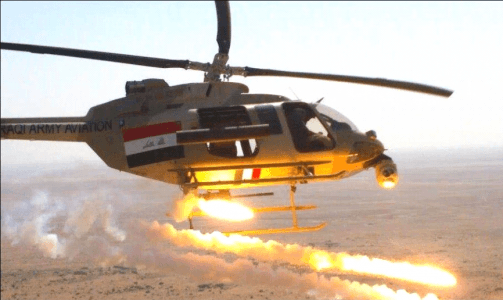
ISIS car bomb factories blown by Iraqi bombers in Western Anbar
The Iraqi Air Force conducted dozens of sorties over ISIL-held Western Anbar amid a wider bid to prevent militants from a safe haven on the desert border with Syria.
According to a military source, three car bombs factories and three weapons storage bases were set alight by Iraqi warplanes in the ISIL controlled town of Rawa, anchored on the Euphrates River, AMN reported.
Meanwhile, heavy clashes broke out in nearby city of Hit after two ISIL sleeper cells opened fire on the Popular Mobilization Units (PMU) and Iraqi Army. Although skirmishes lasted for a couple hours, both suicide bombers were neutralized while government forces sustained zero casualties.
With the ISIL withdrawing all its armored vehicles to Syria prior to last year’s encirclement of Mosul, car bombs played an integral part of the ISIL’s strategy of defense for Iraq’s second largest city, leading to a 9-month long battle subsequently.
On Sunday, the Iraqi Army finally recaptured the key town of Mosul, ISIL’s de facto capital in the Arab country, after 9-month of bloody battle with the Takfiri terrorists in Nineveh province.
The military operation by Iraqi Army troops to liberate the Northern city of Mosul from ISIL militants intensified in recent weeks, as Baghdad forces laid full siege on the terrorists in the few districts that were under the Takfiri group’s control with the only hundreds of fighters.
The General Command of Iraq’s Joint Operation announced Saturday in a statement that the old part of Mosul city (Old Mosul district) came under the full control of the Iraqi forces.
The Old City is home of the 850 year-old Grand al-Nuri Mosque and is highly symbolic because it was there that leader of the ISIL group, Ibrahim al-Samarrai, also known as Abu Bakr al-Baghdadi, declared himself the so-called caliphate of the Takfiri terrorist group, shortly after the flashpoint city fell to terrorists in June 2014 and became their de facto capital in Iraq.
But, the ISIL militants committed another historical crime by blowing up the ancient al-Nuri mosque and its historical al-Hadba minaret, as the group’s days in the war-torn city were numbered due to rapid advances of Iraqi soldiers.
The Iraqi state TV declared approximately ten days ago that the ISIL collapsed in Mosul after the army regained control of al-Nuri mosque. The Iraqi troops won back control of the wrecked historic mosque of Mosul.
Iraqi Prime Minister Haider al-Abadi announced in October 2016, the start of a military operation to recapture Mosul, the second largest city in Iraq which fell to the ISIL since 2014.
Baghdad declared earlier in January that the Iraqi troops managed to capture the Eastern part of the key ISIL stronghold.
The Iraqi Army started a new phase of its military operation in Nineveh province late February to drive the ISIL terrorists out of their bastion in the Western part of the city of Mosul.
The second largest city in Iraq fell to the ISIL group in 2014, when the Takfiri terrorists began a campaign of death and destruction in the Arab country.
The United Nations predicted that it will cost more than $1 billion to repair basic infrastructure in Mosul. In some of the worst affected areas, almost no buildings appear to have escaped damage.
An estimated 862,000 people have been displaced from Mosul ever since the battle began nine months ago. A total of 195,000 civilians have also returned to the liberated areas of Eastern and Western Mosul.
Source: Farsnews





